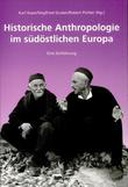Explore

Historische Anthropologie im südöstlichen Europa
Die bislang vor allem ethnozentrierte Perspektive auf Geschichte und Kultur Südosteuropas hat viel zu den unübersehbaren Spannungen in der Region beigetragen. Eine historisch-anthropologische Perspektive kann dem Entscheidendes entgegensetzen und ethnozentrierte Blicke auflösen.Dieser erste Überblick über Themenfelder einer Historischen Anthropologie im südostlichen Europa hat Einführungscharakter und weist gleichzeitig auf Forschungsperspektiven hin. Dargestellt werden u. a. folgende Themenfelder: Wanderungen und Anpassungsstrategien; Geschlechterbeziehungen und Lebensphasen; das Gebirge, die Stadt und das Meer; Recht und Disziplinierung; Identitäten. Die Beiträger und Beiträgerinnen stammen sowohl aus Ländern des westlichen als auch des südöstlichen Europa.
This book is included in DOAB.
Why read this book? Have your say.
You must be logged in to comment.
Rights Information
Are you the author or publisher of this work? If so, you can claim it as yours by registering as an Unglue.it rights holder.Downloads
- 102 - pdf (CC BY-NC-ND) at OAPEN Library.
- 177 - pdf (CC BY-NC-ND) at OAPEN Library.
- 265 - pdf (CC BY-NC-ND) at OAPEN Library.
Keywords
- anthropology
- Balkanhalbinsel
- Environment
- Family
- Gender relations
- generational relations
- Geschlechterbeziehungen
- historical anthropology
- historical urban anthropology
- Historische Anthropologie
- Kinship
- Lebensphasen
- migration
- Osmanisches Reich
- Religion
- Social conditions
- Society & Social Sciences
- Sociology & anthropology
- Southeastern Europe
- Südosteuropa
- Südöstliches Europa
- thema EDItEUR::J Society and Social Sciences::JH Sociology and anthropology::JHM Anthropology
- youth and age
Links
DOI: 10.26530/oapen_471370Editions

